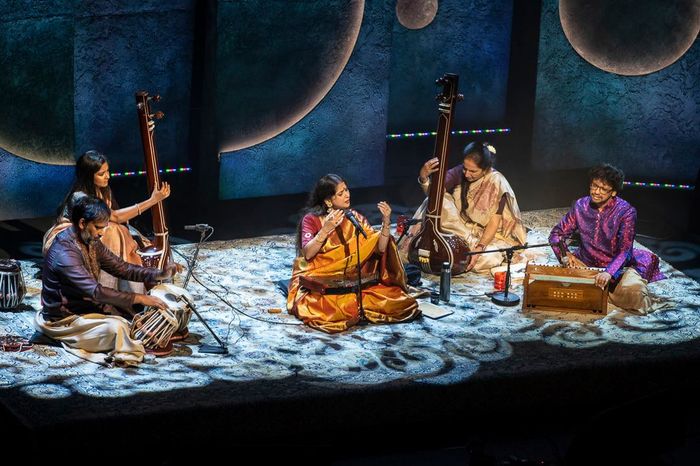Magic, music and Miranda: The Encanto soundtrack
Famke Veenstra-Ashmore breaks down the soundtrack to the latest Disney film, praising Lin-Manuel Miranda’s storytelling and homage to Latin culture

My five year-old sister has become infatuated with Disney’s latest musical, Encanto, filling our own casita with slightly wonky, off-tune cries of ’Bruno-no-no-no’s’ and recalling each grandchild’s gift in her best imitation of their characters. Her repeated summoning of the title prompted our own grandfather – a Chilean immigrant – to define the word. As he explained it, encanto means ‘dear one’, ‘charming one’, usually said in response to a small child. It’s therefore not surprising that much of the music in the film explores a sense of endearing intimacy, reflecting both facets of the story and song-writer Lin Manuel-Miranda’s affection for Latin culture and lifestyles.
“Stephanie Beatriz’s vocals do most of the work in portraying Mirabel’s intense desire to match her family”
Set in Colombia, the film’s soundtrack draws upon Latin music to frame its score and musical numbers. Chords and rhythms reminiscent of earlier Latin musicals such as West Side Story, Evita, and Miranda’s own In the Heights are blended with hip-hop elements which call back to Hamilton, as well as bold Disney ballads. The musical’s opener, ‘The Family Madrigal’, is an upbeat introductory piece, inspired by Beauty in the Beast’s ‘Belle’ in its deft illustration of the townspeople and main characters. Much like the aforementioned film, Miranda and Germaine Franco create an antiphony between different instruments and different features of the house – with drums, accordions and xylophones mimicking the drawers and floors that protagonist Mirabel calls to. As expected, Miranda pins much of his storytelling on rhyme; the internal rhymes of ‘Madrigal’, ‘fantastical’, and ‘magical’ create an echoing, reverberating effect which amazingly transforms the film’s creative take on magical realism into a musical equivalent.
Miranda rises to the challenge of fleshing out twelve principle characters in four minutes, associating each character which a musical motif, rhythm, or melody which not only illustrates their personalities but also links to other parts of the soundtrack, creating a musical narrative which makes sense both as a cohesive portrait of the family and as its composite parts. Abuela’s lines in ‘The Family Madrigal’, for example, share the exact melody of ‘Dos Oruguitas’, a beautiful Colombian-style folk song written by Miranda and performed by Sebastian Yatra – which tells the story of her relationship with her late husband. This isn’t Miranda’s sole collaboration on the soundtrack; Carlos Vives’ ‘Colombia, Mi Encanto’ is a joyous celebration of all things Colombian. In these songs, Miranda blends his love for the musical styles incorporated with the renown of these singers, and describes it as a “dream come true”.
“The dramatic quality of each character’s verses layered on top of each other is comparable to In the Heights’ ‘96,000’”
The opening is followed by Mirabel’s ‘I want’ song – a common song-trope of musicals in which the protagonist outlines their aspirations – ‘Waiting on a Miracle’. With relatively stripped back instrumentation, Stephanie Beatriz’s vocals do most of the work in portraying Mirabel’s intense desire to match her family. Her repeated gestures of ‘all I need’ are inextricably tied to Miranda’s intention behind this ‘I want’ song, and, like many of the characters he invents or helps shape, the want is more of a need. While it doesn’t carry the same resonance as songs like Moana’s ‘How Far I’ll Go’, it maintains a similar power, and takes advantage of its pop-ballad style to portray Mirabel’s determination. Miranda’s versatility is reflected in the following number ‘Surface Pressure’, which plays with a lower female vocal range to denote the pressure Mirabel’s older sister Luisa feels as the braun of the family. Jessica Darrow’s powerful voice, combined with intermittent rapping and overemphasised breaks for air – signalling the character’s struggle – make this a stand-out song.
‘We Don’t Talk About Bruno’ earns its popularity through its seemingly endless reel of catchy hooks that bounce from character to character. Musically, it combines the multifaceted, unique rhythms of Colombia and the typical ensemble numbers of mainstream musicals. But, its cleverness is especially demonstrated in its lyrics, which, when read sympathetically, demonstrate to the audience how understood its titular character is, also make for a more political reading about taboo subjects in Latin American culture. Dynamics are also utilised in this song to portray extremities and to emphasise the secretiveness of Bruno’s character, ranging from Dolores’ quiet rapping to Camilo’s dramatic, haunting verse. The dramatic quality of each character’s verses layered on top of each other is comparable to In the Heights’ ‘96,000’. Isabela’s ‘What Else Can I Do’ closely following this track successfully summarises the film’s overall focus on transformation and being empowered to break from tradition in its lyrics, offering Manuel Miranda’s take on 90s’ rock en español.
‘All of You’ harks back to the melodies of the opening song, its changed lyrics reflecting the journey of the family. It also brings back lines from the previous track, including a short rap section – which screams Miranda in its colloquial rhyming. In just six main vocal numbers Miranda is able to introduce a cast of characters and develop them as individuals. He builds upon his own body of work, borrowing ideas from pre-existing concepts and characters, and projects them onto this feature, deriving further inspiration from Disney’s portfolio, as well as the local sounds and culture of Colombia. All of this culminates in a musical celebration of community and family, the fictional and the personal, and the cultural and the artistic, becoming its own musical encanto.
 News / Uni Scout and Guide Club affirms trans inclusion 12 December 2025
News / Uni Scout and Guide Club affirms trans inclusion 12 December 2025 News / Cambridge Vet School gets lifeline year to stay accredited28 November 2025
News / Cambridge Vet School gets lifeline year to stay accredited28 November 2025 News / Cambridge study finds students learn better with notes than AI13 December 2025
News / Cambridge study finds students learn better with notes than AI13 December 2025 Science / Did your ex trip on King’s Parade? The science behind the ‘ick’12 December 2025
Science / Did your ex trip on King’s Parade? The science behind the ‘ick’12 December 2025 News / Pembroke to convert listed office building into accom9 December 2025
News / Pembroke to convert listed office building into accom9 December 2025









